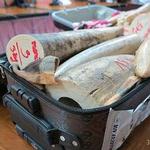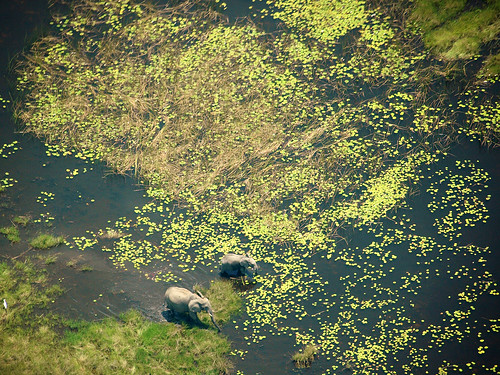波札那政府和世界自然保育聯盟(IUCN)12月2日至4日共同召開非洲象高峰會,會議上發表的最新數據顯示,如果盜獵情形持續不減,非洲在10年內將失去5分之1的大象。與會國家並達成遏止非法貿易的緊急協議,同意實施「零容忍政策」,將野生動物走私歸類為「重大犯罪」。
包括波札那、加彭、肯亞、尼日和贊比亞等非洲象所在地國家,越南、菲律賓、馬來西亞等象牙運輸國家,以及象牙最終銷售國家──中國和泰國,各國代表皆同意會議中訂定的14項相關措施,其中一項是將野生動物走私歸類為「重大犯罪」。此措施將啟動聯合國打擊跨國組織犯罪公約(United Nations Convention Against Transnational Organized Crime)下的各項國際執法合作行動,包括法律互助、資產扣押沒收以及引渡野生動物罪犯。
為打擊2009年以來的象牙盜獵和走私潮,各國政府將以現行的法律加上更嚴謹的監管框架,調查、逮捕、扣押和起訴涉嫌野生動物犯罪者。與會各國同意實施「零容忍政策」,對盜獵和走私罪犯處以「最重且具嚇阻力」的罰則,並實施涵蓋野生動物、貪汙、洗錢、組織犯罪、槍枝濫用和恐怖主義等多個面向的相關法律,以及同意讓非洲象棲息地的社區居民加入保育工作。
 IUCN和兩個監督非洲象的組織在高峰會上發表最新分析報告,指出1990年代趨緩的盜獵和走私情形,在2000年代中期開始逐漸增加,並於2009年後直線攀升。2012年與2011年相比,整體趨勢見緩,但仍然維持在非常高的水平。
IUCN和兩個監督非洲象的組織在高峰會上發表最新分析報告,指出1990年代趨緩的盜獵和走私情形,在2000年代中期開始逐漸增加,並於2009年後直線攀升。2012年與2011年相比,整體趨勢見緩,但仍然維持在非常高的水平。
華盛頓公約秘書處「非法大象屠殺監控計畫」(MIKE)發表的分析則指出,2012年MIKE監控的42處地點有15000頭大象遭非法獵殺。根據MIKE的報告,2012年整個非洲大陸共有22000頭大象遭非法獵殺,略少於2011年預估的25000頭。
今年截至目前為止共查獲18起大規模象牙走私,總計超過40噸,達到25年來的最大量。一般象群的自然族群成長率不到5%,2012年的預估盜獵比例是7.4%,仍是讓象群無法永續生存的比例。
African and Asian nations where elephants are poached or their ivory is illegally shipped or sold today agreed on urgent measures to halt the illegal trade and secure the survival of African elephants.
New data released Monday shows that if poaching continues at current levels, Africa is likely to lose a fifth of its elephants in the next 10 years.
Government agreed to apply “a zero tolerance approach,” and sentence those convicted to “maximum, and therefore deterrent” penalties to combat an upsurge in poaching and smuggling of elephant ivory since 2009.
They will use a combination of existing laws and strengthened regulatory frameworks for investigation, arrest, seizure and prosecution of suspected wildlife criminals. Laws covering wildlife, corruption, money laundering, organized crime, firearms employment and terrorism may be employed for this purpose, governments agreed.
The agreement was reached at the ongoing African Elephant Summit convened by the government of Botswana and the International Union for Conservation of Nature, IUCN.
The measures were agreed by African elephant range states, including Botswana, Gabon, Kenya, Niger and Zambia, ivory transit states Vietnam, Philippines and Malaysia and ivory destination states, including China and Thailand.
One of the 14 measures the delegates committed their governments to involves classifying wildlife trafficking as a “serious crime.”
This will unlock international law enforcement cooperation provided under the United Nations Convention Against Transnational Organized Crime, including mutual legal assistance, asset seizure and forfeiture and extradition to hold criminals accountable for wildlife crime.
Governments also agreed to engage communities living with elephants in their conservation.
They will mobilize financial and technical resources to combat wildlife crime and attempt to reduce demand for illegal ivory.
A comprehensive analysis was issued in December for the summit. Prepared by the IUCN and two other organizations responsible for monitoring elephants, the analysis shows that following an easing in the 1990s levels of poaching and the illegal ivory trade started to increase again in the mid-2000s. The rate of increase jumped sharply after 2009. The overall trend appears to be leveling off in 2012 compared to 2011, but at an unsustainably high level.
Analysis by the program for Monitoring the Illegal Killing of Elephants, MIKE, managed by the CITES Secretariat, suggests that 15,000 elephants were illegally killed at the 42 monitored MIKE sites in 2012.
According to MIKE, an estimated 22,000 elephants were illegally killed continent-wide in 2012, a slight reduction from the estimated 25,000 elephants poached in 2011.
The estimated poaching rate of 7.4 percent in 2012 remains at an unsustainably high level, as it exceeds natural population growth rates – usually no more than five percent.
Eighteen large scale seizures involving more than 40 tonnes have been recorded so far this year – the greatest quantity of illicit ivory seized over the last 25 years.
※ 全文及圖片詳見:ENS
※加入「環境資訊中心」粉絲頁,來給環境按個讚 https://www.facebook.com/enc.teia






